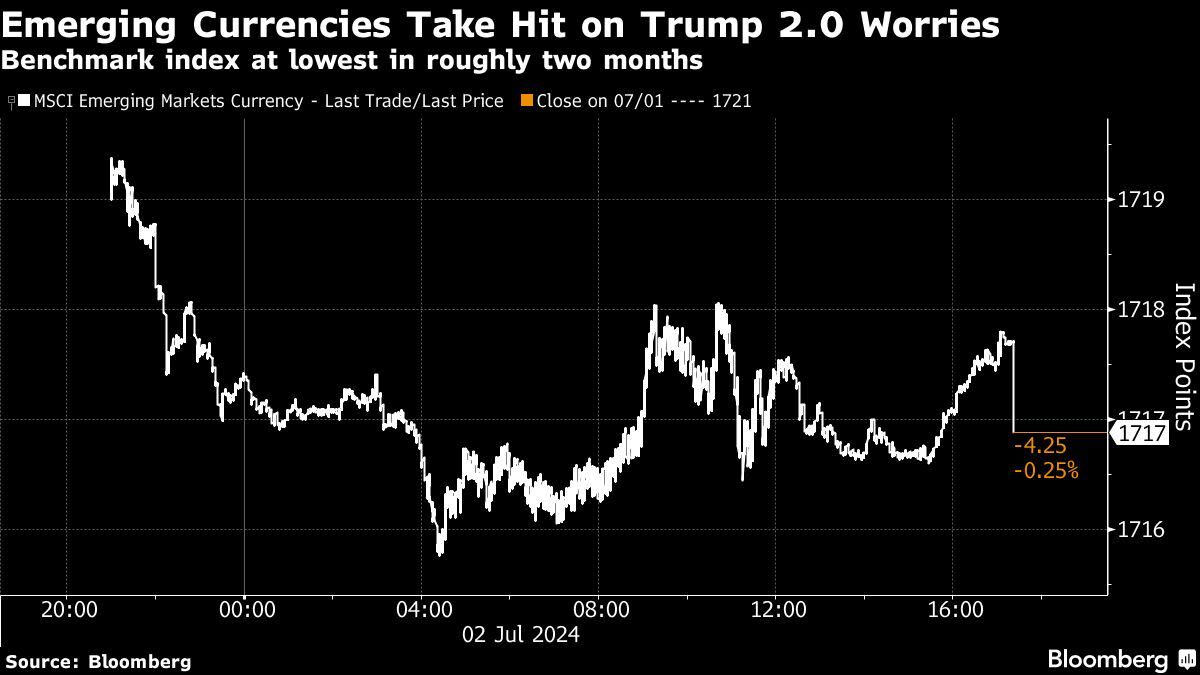Emerging Currencies Slip to Two-Month Low on Trump Worries

(Bloomberg) -- Emerging-market currencies fell Tuesday as concerns over a potential Trump victory in November’s presidential election fuel bets on higher US Treasury yields, outweighing remarks from Fed Chair Jerome Powell that inflation is getting back on a downward path.
Most Read from Bloomberg
US Allies Allege China Is Developing Attack Drones for Russia
China Can End Russia’s War in Ukraine With One Phone Call, Finland Says
Democrats Weigh Mid-July Vote to Formally Tap Biden as Nominee
The MSCI gauge for developing currencies slid 0.2% to a two-month low, with Thailand’s baht, Indonesia’s rupiah and South Africa’s rand lagging peers. An index of EM stocks fell 0.7% at the close Tuesday, with shares of Taiwan Semiconductor Manufacturing, Hon Hai Precision Industry Co. and Tencent Holdings Ltd. pacing declines.
Traders are worried that Trump’s plans to slash taxes and raise tariffs, if elected, could stoke inflation and force the central bank to keep monetary policy restrictive for longer.
“A Trump presidency is likely to induce more US inflation, leaving Treasury yields elevated, thus sustaining rates pressure on emerging markets,” said Nick Rees, a currency analyst at Monex Europe.
Investors have been buying shorter-maturity US Treasury notes and selling longer-term ones after Trump came out ahead of President Joe Biden in the first presidential debate last week. The trade has been touted by a chorus of Wall Street strategists in recent days, with Morgan Stanley and Barclays urging clients to prepare for sticky inflation and higher long-term bond yields in another Trump term.
Emerging-market investors largely shrugged off the latest clues on the Federal Reserve’s path to cutting rates. US job-openings unexpectedly rose in May, interrupting a trend that underscored a slowdown in labor seen as key for Fed easing. Powell, speaking before the data’s release, said there’s been a “substantial” move toward better balance between the supply of and demand for workers. He described the job market as strong, but said it is cooling off appropriately.
Elsewhere in currency markets, the Brazilian real whipsawed as traders continue to adjust for growing conflict between the government and the nation’s central bank. President Luiz Inacio Lula da Silva escalated his attacks on policymakers, saying the institution led by Governor Roberto Campos Neto needs to be autonomous and not “owned” by financial markets.
“Lula’s attacks on the bank and his growing control via his appointments is unnerving the markets, and rightfully so,” said Win Thin, managing director at Brown Brothers Harriman & Co. in New York. The “market is pricing in the start of a tightening cycle over the next three months, which seems aggressive, but not out of the question if BRL weakness continues.”
Credit Markets
In credit markets, El Salvador’s sovereign bonds were the best performers in emerging markets on bets that a Trump victory could increase the chances of an International Monetary Fund deal as the former US president looks to stem immigration. The notes rose at least 1.9 cents on the dollar across the curve, according to pricing data compiled by Bloomberg.
El Salvador President Nayib Bukele “likely believes that he will be able to negotiate a more favorable agreement with the IMF under a Trump presidency,” said Barclays analyst Jason Keene. “And as the market has priced in greater odds of a Trump victory over the last several days, El Salvador has benefitted from that sentiment shift.”
Chile tapped fixed-income investors with a social bond, one of the first sales by emerging-market sovereigns in what’s expected to be a slower second half of the year after a flurry of activity in the first few months of 2024.
Ukraine signaled that it expects restructuring talks for its $20 billion of international debt to conclude by an Aug. 1 deadline and to include treatment of its GDP-linked warrants.
--With assistance from Selcuk Gokoluk.
Most Read from Bloomberg Businessweek
China’s Investment Bankers Join the Communist Party as Morale (and Paychecks) Shrink
The Fried Chicken Sandwich Wars Are More Cutthroat Than Ever Before
For Tesla, a Smaller Drop in Sales Is Something to Celebrate
Dragons and Sex Are Now a $610 Million Business Sweeping Publishing
©2024 Bloomberg L.P.

 Yahoo News
Yahoo News 

